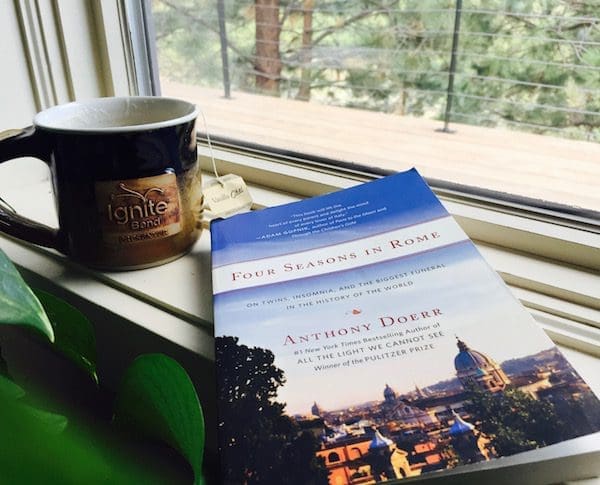Author Anthony Doerr spent a year in Rome on a writing fellowship. One of the things this ancient, spellbinding city taught him was how dangerous habit can be when it causes the spectacular to become routine:
Imagine if we only got to see a cumulonimbus cloud or Cassiopeia or a snowfall once a century: there’d be pandemonium in the streets. People would lie by the thousands in the fields on their backs.

Photo by Cédric Dhaenens on Unsplash
The Rome Prize, awarded to Doerr, included a stipend and use of a writing studio in Rome. He documented that year in a memoir, Four Seasons in Rome: On Twins, Insomnia, and the Biggest Funeral in the History of the World.

Photo: Marlys
Doerr wrote about sleepless nights with newborn twins; about the forays he and his wife and their two boys made into the heart of Rome; about meeting wonderful local people — in the neighborhood bakery, at the grocers and the butchers — and the child-rearing advice they freely gave.
In short course, Doerr came to value the beauty and uniqueness of the culture: The language, the customs and foods and celebrations and architecture and people.
In his memoir, Doerr wrote how we need habit to get through a day, to get to work, to feed our children.
Without habit, the beauty of the world would overwhelm us. We’d pass out every time we saw—actually saw—a flower.

Photo by Simone Dalmeri on Unsplash
If we need habits, but they can dangerously turn the everyday extraordinary into the everyday mundane, where is the balance?
Doerr offers a remedy:
Leave home, leave country, leave the familiar.
Leave home.
I was gone from home for a total of eight weeks recently. And while I enjoyed being with every family member and friend in every location, coming home was magical and invigorating and extraordinary. I revel in the beauty of where I live, the coziness of my small home, the delight of walking along the creek that rushes over boulders in the nearby park. This is my good life, and leaving it made me see it differently. better. more appreciatively.
When was the last time you left home for any length of time?
Leave the country.
One of the highlights of traveling in the Middle East with three of my nieces last year was a long and bumpy road trip from Israel to Cairo. Someone rode shotgun in our van (literally) and there were multiple middle-of-the-night checkpoint stops, but it was so worth it to see the pyramids up close and personal.
And it caused me to consider those things we deem as ordinary in the United States—like, paved roads, and cross-country travel without armed guards, and clean restrooms with toilet paper and running water and soap—to be remarkable and astonishing and exceptional
Leave the familiar.
I attended a meeting in Portland this weekend, which meant 3.5 hours sitting behind the wheel of my vehicle, 3 hours in a meeting, and then 3.5 hours back behind the wheel. Ten straight hours.
When I walked into my sweet little home around dusk, I saw it through fresh and grateful eyes. I made a cup of Chai tea, and settled into the cozy couch facing the French doors that overlook impossibly tall evergreens, and recited gratitude lists in my head for the sweetness of the ordinary, everyday, gorgeous place and life I’ve been assigned to.
Anthony Doerr provides a reason for leaving home, leaving country, leaving the familiar:
Only then can routine experience—buying bread, eating vegetables, even saying hello—become new all over again.
Why is it we humans tend to not appreciate things like flush toilets and paved highways and our health and the freedom to move about the country and public parks and wilderness areas and Chai tea until … well, until we’ve had to do without them?
Which begs the question: What are your travel plans in the next weeks and months, and for the rest of 2018?
P.S. If you know someone who needs to leave the familiar, please share, tweet or pin!

Leave a Reply